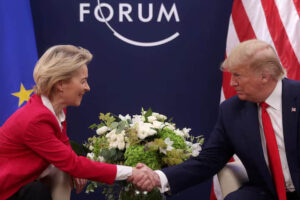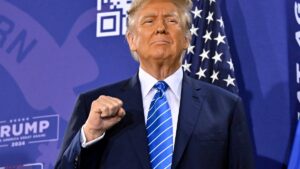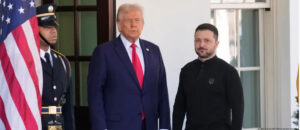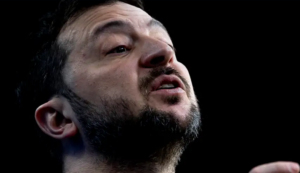
European Commission President Ursula von der Leyen will meet with US President Donald Trump on Sunday to discuss the prospects for a trade agreement between the EU and the US. Von der Leyen announced this on Platform X on Friday evening.
“After a productive conversation with the US president, we agreed to meet in Scotland on Sunday to discuss transatlantic trade relations and how we can keep them strong,” von der Leyen wrote on X.

On May 23, 2025, US President Donald Trump announced his intention to impose a 50% tariff on all goods imported from the European Union starting June 1. This decision was explained by the lack of progress in trade negotiations and accusations of unfair trade policies on the part of the EU.
Trump stressed that the EU is “very difficult to do business with” and that the negotiations are “going nowhere.” He also noted that goods produced in the US will not be subject to the new tariffs.
In addition, Trump threatened to impose a 25% tariff on Apple products if the company does not move iPhone production to the US. This statement caused Apple shares to fall 3% in pre-market trading.
Analysts warn that the introduction of 50% tariffs could lead to a 1.7% decline in GDP in Germany and a 4% decline in Ireland over three years. European markets reacted with a decline: the Stoxx Europe 600 index fell 1.7%, and shares of exporters such as Stellantis and Deutsche Bank lost up to 4.6% in value.
The EU is considering retaliatory measures, including the introduction of tariffs on US goods worth up to €95 billion, including Boeing products, cars, and bourbon. Negotiations between EU and US representatives are continuing, but the prospect of a large-scale trade war is causing concern on both sides.
Thus, the measures announced by Trump could significantly exacerbate trade relations between the US and the EU, affecting global markets and the economy as a whole.

U.S. President Donald Trump on Saturday enacted 10% base tariffs on most imports, continuing his strategy of encouraging domestic investment and helping companies that seek to avoid import taxes, according to a Bloomberg report on Saturday.
Although the base duty is already starting to apply, for some countries the higher duties, which replace rather than add to the prime rate, will take effect April 9.
These new tariffs raised U.S. duties to the highest level in more than a century, dealing a major blow to the global trading system that emerged after World War II and which Trump has long called unfair, the publication reported.
The U.S. president’s statement sent U.S. stocks plummeting, with the S&P 500 index plunging to its lowest level in 11 months, losing $5.4 trillion in market value in just two trading sessions to end the week. It was the biggest two-day drop since the U.S. pandemic began in March 2020.
Afterward, Trump said he was willing to cut duties if other countries offered him something “phenomenal”.

Ukraine is no longer a top US priority under President Donald Trump. As he appears to be inching closer to Vladimir Putin’s Russia, the Trump administration seems more likely to defend Taiwan and Israel than Ukraine.
Looming trade wars with China and Europe, tariff disputes with neighbors Canada and Mexico, the war in Gaza, plummeting stock markets, and protests against mass layoffs: US President Donald Trump is currently fighting on many (partly home-made) fronts at the same time.
Amid these crises, there is another question. Will the US let Ukraine fall? It seems only a matter of time before it is answered with a “yes.”
After a number of unsuccessful attempts to impose a temporary ceasefire between Kyiv and Moscow, there are many factors that seem to point towards this menacing scenario.
Trump: Ukraine ‘may not survive’
Trump recently addressed the issue himself. In an interview with the US broadcaster Fox News after an altercation with his Ukrainian counterpart Volodymyr Zelenskyy at the White House on February 27, the US president was asked by the anchor Maria Bartiromo whether he was “comfortable” with the idea that Ukraine “may not survive” the war with Russia.
“Well, it may not survive anyway,” Trump told Fox News. “It takes two. Look, it was not going to happen, that war, and it happened. So, now we’re stuck with this mess.”
Marco Rubio, the new US secretary of state, also made clear that Ukraine was not top of the Trump administration’s priorities at his hearing before the Senate Foreign Relations Committee on January 15.
Rubio said that the US would continue to stand by its closest allies, mentioning Taiwan and Israel explicitly. Regarding Ukraine, he said it was time to be “realistic” and suggested that both sides would have to make “concessions.”
“But ultimately, under President Trump, the top priority of the United States Department of State will be the United States,” he said. “American taxpayer dollars should only be spent to advance US interests, and every penny should be scrutinized to ensure its sincerity and effectiveness.”
In a recent op-ed for The Guardian, Stephan Wertheim, an expert on US foreign policy at the Carnegie Endowment for International Peace, pointed out that “none of Trump’s predecessors ever made a commitment to fight for Ukraine. Joe Biden explicitly ruled out sending US troops when he saw Russia’s full-scale invasion coming.”
He added that no NATO allies had come to Ukraine’s direct defense. “The reason is obvious: it would mean war with Russia, a prospect that Nato allies can still deter regardless of what happens in Ukraine.”
“If Ukraine and Europe continue to push for strong US security guarantees,” he continued. “They have a small chance of succeeding and a larger chance of creating a permanent rupture with Trump. The president could conclude that his allies refuse to listen and, worse, keep trying to entrap him.”
Is Ukraine a pawn in the Russia-US relationship?
Stefan Meister, the head of the Center for Order and Governance in Eastern Europe, Russia, and Central Asia at the German Council on Foreign Relations, is very critical of Trump’s refusal to offer security guarantees to Ukraine.
The US president has “already massively worsened his own negotiating position and that of Ukraine,” he told German broadcaster SWR. “Why should Moscow make any compromises when the US president is already offering half of what Russia is demanding?”
He said that he was worried that Ukraine could simply fall by the wayside as Russia-US relations were readjusted. “My impression is that Trump ultimately doesn’t really care about Ukraine,” he said, explaining that Ukraine might just be “a pawn” given to Russia in return for “other things.”
These “other things” could be related to the topics mentioned by Rubio. Israel and peace in the Middle East, relations with China, dealings with Iran, and a rapprochement between Washington and Moscow.
The US columnist Robert Kagan has no illusions. “President Trump has made it clear that the US is no longer prepared to defend Europe,” the former Republican, who has advised several US presidents, said in an interview with the German weekly newspaper Die Zeit.
Kagan said that the idea of standing up for democracy in other regions of the world was alien to Trump. “He seems to have no qualms about concluding a ‘deal’ with Putin’s criminal regime over the heads of the Europeans.”
https://www.dw.com/en/how-much-will-trump-white-house-back-ukraine/a-71933259

The US wants to trade further military and financial aid to Ukraine for access to the country’s vast rare earth reserves. But some might already be under Russian control, and the EU is moving in for its share, too.
US President Donald Trump has placed new conditions on further financial and military aid to Ukraine.
On Monday, he told reporters that Washington would only continue aiding Ukraine in warding off Russian aggression in exchange for rare earth minerals.
Kyiv had already indicated it would be willing to trade access to these valuable natural resources for Western support. In fact, it was one of the points Ukrainian President Volodymyr Zelenskyy had outlined in the “victory plan” that he presented late last year when it was still unclear who would occupy the White House in 2025.
At the time, Zelenskyy had been in talks with Trump, and had promised any country willing to support Kyiv that there would be “returns on investments” made in his country. While presenting his plan, he also mentioned Ukraine’s rich natural resources, which amounted to “trillions of US dollars’ worth of vitally important metals.”
Indispensable in modern industries
Rare earth minerals are needed to produce many modern devices, such as smartphones, electric vehicles, and other high-tech products. They are indispensable in weapons manufacturing and the aerospace industry.
China currently controls the lion’s share of industrially used rare earth minerals worldwide. According to a recent report
by the World Economic Forum, this covers about 40% of the European Union’s (EU) needs for these resources. Other key providers include Australia, South Africa, Canada and Brazil.
To reduce their dependency on China, the US and EU have been working together for years on expanding and increasing the production of vital resources in other countries. These metals, include, above all, uranium, titanium, lithium, graphite, nickel, and aluminum.
Last year, a study
by the NATO Energy Security Center of Excellence found that the market for critical minerals “has doubled to over $320 billion [€308.7 billion] in the last five years and is foreseen to double again in the next five.”
Enormous wealth of critical minerals
The NATO experts also noted that “the strategic importance of Ukraine’s critical materials cannot be overstated,” arguing that the country could become a key supplier of rare earth minerals, including titanium, lithium, beryllium, manganese, gallium, uranium, zirconium, graphite, apatite, fluorite and nickel. These vast reserves could “significantly contribute to the global supply chain for many, if not all,” prominent industries.
Ukraine’s titanium reserves are thought to be Europe’s largest, making some 7% of global reserves. It’s one of the few countries mining titanium, which is a key resource for the aerospace, medical, automotive and marine industries, for example.
Estimated at around 500,000 tons, Ukraine also holds some of Europe’s largest known lithium reserves. This material is critical for producing batteries, ceramics, and glass.
Ukraine is also the world’s fifth-largest producer of gallium, which is used for producing semiconductors and light-emitting diodes (LEDs). Finally, Ukraine is a critical supplier of neon gas, required for producing semiconductors.
The World Economic Forum report further found that the European Commission had identified Ukraine as a potential supplier for over 20 critical raw materials. The body recommended that Europe continue to encourage Ukraine to export these materials, and concluded that Ukraine’s accession to the EU could strengthen the European economy.
Ukraine an important part of the EU resource strategy
Kyiv seems to be well aware of its key position as a potential global supplier of critical minerals needed for key industries. At a conference on strategic resources, the former Ukrainian infrastructure minister an co-founder of the investment think tank We Build Ukraine, Oleksandr Kubrakov, noted that, “we own crucial resources, we are strategically well-positioned within the EU context, our logistical infrastructure is well-developed and we are highly competent in discovering and exploiting resources.”
But critics say that optimal conditions for mining critical minerals would require governmental oversight, a stable regulatory framework, an economically tolerable tax policy, and investments. It’s uncertain if the US, should it gain access to some of Ukraine’s critical natural resources, would even be able to initiate such structural change.
Meanwhile, authorities in Kyiv are already reporting on first steps and concrete plans: “We are currently making data on these minerals public and have worked out many regulatory and legal measures,” Olena Kramarenko, Ukraine’s deputy minister of environmental protection said.
She added that the strategic goal was to “integrate Ukraine into the EU’s resource strategy.”
Some reserves occupied by Russia
The largest hurdle to exploiting rare earth minerals in Ukraine remains Russia’s war of aggression. There are no reliable numbers available of just how many rare mineral reserves are under Russian control, or dangerously near front lines.
Ukrainian experts told DW they believe that Russia could be trying to gain control over at least two lithium reserves. Of the four known across Ukraine, only two are sure to be under Ukrainian control.
The territories of Zaporizhzhia and Donetsk, where the other two reserves are located, are currently under Russian occupation.
https://www.dw.com/en/ukraines-rare-earths-are-key-to-its-bargaining-power/a-71531476